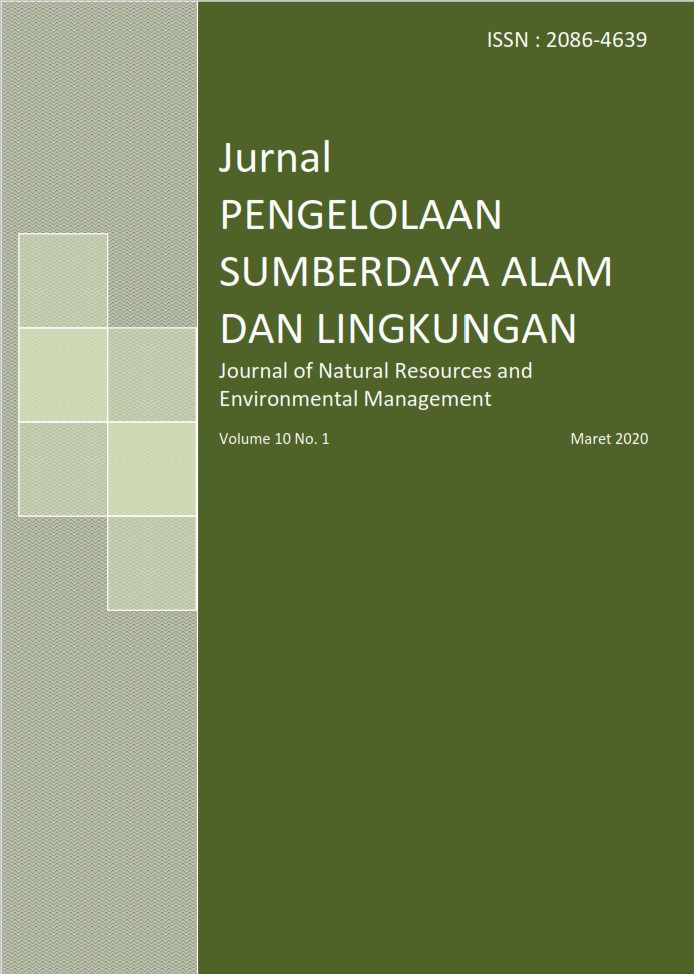Abstract
Poverty is both a cause and a victim of deteriorating environmental quality. The poor are regarded as very dependent on the environment and natural resources in sustaining their lives so that the environment and natural resources are exploited regardless of their sustainability. On the other hand, environmental degradation causes the poor to get out of poverty. This study aims to (1) analyze the general picture of environmental quality and poverty, (2) analyze the effect of poverty on the environment, (3) analyze the effect of environmental quality on poverty along with other supporting factors in Indonesia 2012-2014. The analytical method used is simultaneous equation with EC2SLS method. The results show that poverty can affect environmental degradation but not vice versa. Exogenous variables that significantly affect the quality of the environment are the growth of the number of poor, economic growth, population density, and literacy rate. Exogenous variables that have significant effect on poverty are economic growth, wage, population density, and literacy rate.
References
Adianti, Gandari. (2005). Analisis Faktor-faktor yang Mempengaruhi Kemiskinan di DKI Jakarta (Studi Komparatif di Permukiman Kumuh dan Tidak Kumuh) [Tesis]. Bogor: Institut Pertanian Bogor.
Arifin, B. (2002). Tekanan Penduduk dan Degradasi Sumberdaya Alam di Tengah Upaya Pemulihan Ekonomi. Dalam B. Arifin, Prosiding Seminar Tekanan Penduduk, Degradasi Lingkungan, dan Ketahanan Pangan . Bogor: Pusat Studi Pembangunan LP IPB.
Badan Pusat Statistik. (2015). Laporan Bulanan Data Sosial Ekonomi. Jakarta: Badan Pusat Statistik.
Baltagi, B. H. (2005). Econometric Analysis for Panel Data- Third Edition. United Kingdom: John Wiley and Sons Ltd.
Budiman, A. (1995). Teori Pembangunan Dunia Ketiga. Jakarta: PT. Gramedia Pustaka Utama.
Dariah, Atih Rohaeti. (2007). Dampak Pertumbuhan Ekonomi dan Kemiskinan terhadap Degradasi Lingkungan di Jawa Barat. [Tesis]. Bogor: Institut Pertanian Bogor.
Gaeddert, L. V., & Oerther, D. (2015). Measuring Multidensional Poverty in a Complex Environment, Identifying the Sensitive Links. Procedia Engineering-Elsevier , 172 – 180.
Ghani, M. Usman Ghani et al. (2014). Review: Poverty Influence on Environment dalam Middle East Journal of Scientific Research 21 (6): 870-874. Pakistan.
Gujarati, D. N. (2003). Basic Econometrics-Fourth Edition. New York: McGraw-Hill.
Hardini, Diah Ayu. (2011). Hubungan Antara Pertumbuhan Penduduk, Kemiskinan, dan Pertumbuhan Ekonomi terhadap Kualitas Lingkungan di Kota Semarang Tahun 2001-2008. [Skripsi]. Semarang: Universitas Negeri Semarang.
Hassan, S. A., Zaman, K., & Gul, S. (2015). The Relationship between Growth-Inequality Poverty Triangle and Environment Degradation: Unveiling the Reality. Science Direct - Arab Economics and Business Journal , 57-71.
Hill, Hal dan M.E. Khan, J. Zhuang (editor). (2012). Diagnosing the Indonesian Economy Toward Inclusive and Green Economy. Philippines: Asian Development Bank.
Hufschmidt, M. M., James, D. E., Meister, A. D., Bower, B. T., & Dixon, J. A. (1983). Environment, Natural Systems, and Development – An Economic Valuation Guide. London: The Johns Hopkins University Press.
Inoguchi, T., Newan, E., & Paoletto, G. (2003). Kota dan Lingkungan - Pendekatan Baru Masyarakat Berwawasan Ekologi. (R. Suryandani, Penerj.) Jakarta: LP3ES.
Irawan, P. B. (2004). Pengelolaan Lingkungan Hidup yang Berkelanjutan dan Strategi Penaggulangan Kemiskinan di Indonesia. Background Paper Round Table Discussion Indonesian Decentralized Environmental and Natural Resources Management (IDEN) Project-UNDP. Jakarta: UNDP.
Ismawan, I. (1999). Risiko Ekologis di Balik Pertumbuhan Ekonomi. Yogyakarta: Media Pressindo.
Kementrian Lingkungan Hidup dan Kehutanan. (2015). Indeks Kualitas Lingkungan Hidup 2014. Jakarta: Kementrian Lingkungan Hidup.
Pratama, Siectio Dicko. (2013). Pengaruh degradasi lingkungan terhadap kemiskinan Indonesia Tahun 2011 [Skripsi]. Jakarta: Sekolah Tinggi Ilmu Statistik.
Tambunan, T. T. (2001). Perekonomian Indonesia. Bogor: Ghalia Indonesia.
Tambunan, T. T. (2013). Perekonomian Indonesia (Kajian Teoretis dan Analisis Empiris). Bogor: Ghalia Indonesia.
Thomas, V., Dailami, M., Dhareshwar, A., Kaufmann, D., Kishor, N., Lopez, R., et al. (2001). The Quality of Growth - Kualitas Pertumbuhan. Jakarta: PT Gramedia Pustaka Utama.
United Nations Department of Economic and Social Affairs. (2015). Sustainable Development Goals. 31 Januari 2016. https://sustainabledevelopment.un.org/sdg1
World Bank. (2002). Linking Poverty Reduction and Environmental Management Policy Challenges and Opportunities. (United Kingdom: UNDP).
World Bank Institute. (2000). Economic Development and Environmental Sustainability. Washington DC: WBI.
World Commission on Environment and Development’s (the Brundtland Commission). (1987). Report Our Common Future. Oxford: Oxford University Press. http://www.un-documents.net
Authors
Authors who publish with this journal agree to the following terms:
- Authors retain copyright and grant the journal right of first publication with the work simultaneously licensed under a Creative Commons Attribution License that allows others to share the work with an acknowledgement of the work's authorship and initial publication in this journal.
- Authors are able to enter into separate, additional contractual arrangements for the non-exclusive distribution of the journal's published version of the work (e.g., post it to an institutional repository or publish it in a book), with an acknowledgement of its initial publication in this journal.
- Authors are permitted and encouraged to post their work online (e.g., in institutional repositories or on their website) prior to and during the submission process, as it can lead to productive exchanges, as well as earlier and greater citation of published work (See The Effect of Open Access).
Article Details
10.32628/IJSRSET2411126
10.24857/rgsa.v18n2-095
10.1007/s41685-024-00370-6
10.20473/jde.v9i1.53416
10.55908/sdgs.v12i1.2545
10.18280/ijsdp.190228
10.24857/RGSA.V18N2-095
10.1063/5.0181178
10.3390/su151914161
10.1016/j.scitotenv.2022.154377
10.32479/ijeep.11563
10.29244/jpsl.10.4.688-698






